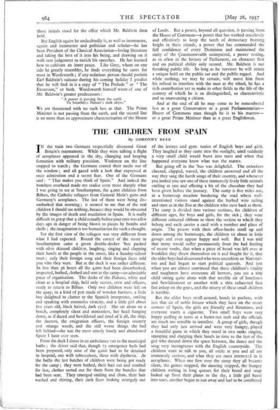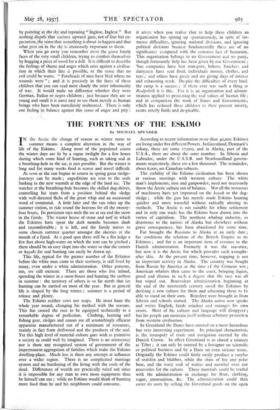THE CHILDREN FROM SPAIN
By GORONWY REES
TN the train two Germans respectfully discussed Great Britain's rearmament. While they were talking a flight of aeroplanes appeared in the sky, changing and keeping formation with military precision. Workmen on the line stopped to watch ; the Germans craned their necks out of the window ; and all gazed with a look that expressed at once admiration and a secret fear. One of the Germans said : "That makes you think of Spain." And indeed the bombers overhead made me realise even more sharply what I was going to see at Southampton, the 4,000 children from Bilbao, the Catholic refugees from General Mola's guns and Germany's aeroplanes. The last of them were being dis- embarked that morning ; it seemed to me that of the real children I should see nothing, because they would be obscured by the images of death and mutilation in Spain. It is really difficult to grasp that a child actually before your eyes was a few days ago in danger of being blown to pieces by bombs and shells ; the imagination is too humanitarian for such a thought.
Yet the first view of the refugees was very different from what I had expected. Round the corner of the street in Southampton came a green double-decker 'bus packed with olive skinned children, laughing, singing and clapping their hands at the people in the street, like a Sunday-school treat ; only their foreign song and their foreign faces told you who they were. But at the dock it was rather different. In less than 36 hours all the 4,000 had been disembarked, inspected, bathed, clothed and sent to the camp—an admirable piece of organisation. The decks of the Habana, white and clean as a hospital ship, held only nurses, crew and officers, ready to return to Bilbao. Only two children were left on the quay, in a kind of pen made of wooden barriers, a little boy delighted to chatter to the Spanish interpreter, smiling and speaking with enormous vivacity, and a little girl about five years old, black haired, dark eyed. She sat alone on a bench, completely silent and motionless, her head hanging down, as if dazed and bewildered and tired of it all, the ship, the doctors, the emigration officers, the 'foreign country and strange words, and the still worse things she had left behind—she was the most utterly lonely and abandoned figure I have ever seen.
From the dock I drove in an ambulance van to the municipal baths ; the driver said that, though 75 emergency beds had been prepared, only nine of the 4,000 had to be detained in hospital, one with tuberculosis, three with diptheria: At the baths the last batches of children were being got ready for the camp ; they were bathed, their hair cut and combed for lice, clothes sorted out for them from the bundles that had been sent. They emerged smiling and clean, their -hair washed and shilling, their dark faces looking strangely out . . _ of the jerseys and gym. tunics of English boys and girls. They laughed as they came into the sunlight, until suddenly a very small child would burst into tears and when that happened everyone knew what was the matter.
But going off in the 'bus was delightful. The onlookers cheered, clapped, waved, the Children answered and all the way they sang the harsh songs of their country, and whenever you looked you saw one of these immensely lively little animals smiling at you and offering a bit of the chocolate they had been given before the journey. The camp is five miles out, in a buttercup meadow bordering the road where well- intentioned visitors stand against the barbed wire railing and stare as in the Zoo at the children who stare back at them. The camp is divided into various sections, for children of different ages, for boys and girls, for the sick ;. they wear different coloured ribbons to show the section to which they belong and each carries a card with a number and place of origin. The priests with their office-books stroll up and down among the buttercups, the children sit about in little groups and even appear happy and well. But I was told that many would suffer permanently from the bad feeding of recent weeks, that when a piece of bread was left over at breakfast they threw themselves on it and fought for it, that the older boys had discovered who were anarchists or National- ists and had, begun to start political quarrels. And just when you are almost convinced that these children's vitality and toughness have overcome all horrors, you see a tiny child sitting quite alone with that terrible air of loneliness and bewilderment or another with a 'thin exhausted face fast asleep on the grass, and the misery of these small children is terrible.
But the older boys stroll around, hands in pockets, with just that air of noble leisure which they have on the street corners of Spain, the girls are friendly and flirtatious, and everyone wants a cigarette. Two small boys were very happy puffing in turns at a burnt-out stub and the officials are much too sensible to interfere. A group of girls, though they had only just arrived and were very hungry, played a beautiful game in which they stood in two ranks singing, stamping and clapping their hands in time to the feet of the girl who danced clovM the space between, the dance and the song very incongruous with the English countryside. The children want to talk to you, all smile at you and all are immensely curious, and what they are most interested in is aeroplanes. When one flew over the camp they-all became silent, the gatiles stopped, the dancing stopped, the hungry children waiting in long queues" for their bread and soup looked up frimn their plates to the sky, -a little girl burst into tears, another began to run away Id had tribe coniforted by pointing at the tkyarick repeating "Inglese, Ingle3e." But nothing dispels that -curious upward gaze, not Of fear biit_ex- pectition, the sense that something is about to haPpen and that . . . . _ what goes. On in the sky is immensely important to them. • . .
. When you 'go away you remember most the grave lonely faces of the very small children, trying to comfort themselves by hugging .a piece of wood for a doll. It is difficult to describe the feelings of shame and anger which arise against a civilisa- tion in Which their fate is possible, or the sense that no , „ evil could be worse. "Foreheads of men have bled where no wounds ivele " ; and it is precisely in the faces of these Children that you can -read most clearly the utter inhumanity of war._ It would make . no difference whether they were German, Italian or negro children ; just because they are so young and small it is most easy to see them merely as human beings who have been mercilessly maltreated. There is only one 'feeling 't.O. balance against this sense of anger and pity : it arises when you realise that to help these children an organisation has sprung up spontaneously, in spite of im- mense difficulties, ignoring national divisions, and ignoring political divisions because fundamentally these arc of no significance compared with the commOu fact cf humanity. This organisation belongs to no Government and no party, though fortunately help has been given by our Government ; 'bus companies have lent transport, bakers, butchers and dairymen have sent food, individuals money, clothes, and toys ; and others have given and are giving days of intense and exhausting work. Despite the difficulties of every kind, the camp is a success ; if there ever was such a thing at Realpolitik it is this. For it is an organisation and admini- stration applied to protecting the real values of human life ; and in comparison the work of States and Governments, which has reduced these children to their present misery, seems utterly futile and despicable.







































 Previous page
Previous page